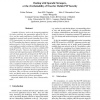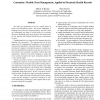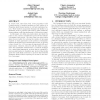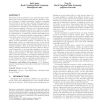391 search results - page 41 / 79 » Attack-Resistance of Computational Trust Models |
DEXAW
2007
IEEE
13 years 12 months ago
2007
IEEE
A number of factors, such as the increasing popularity of wireless networks, the opportunities offered by 3G services, and the rapid proliferation of mobile devices, have stimulat...
CSFW
2004
IEEE
13 years 11 months ago
2004
IEEE
We study the specification of access control policy in large-scale distributed systems. We present Cassandra, a language and system for expressing policy, and the results of a sub...
PODC
2012
ACM
11 years 10 months ago
2012
ACM
In recent years, there have been a few proposals to add a small amount of trusted hardware at each replica in a Byzantine fault tolerant system to cut back replication factors. Th...
ICSE
2003
IEEE-ACM
14 years 8 months ago
2003
IEEE-ACM
Reusable components equipped with strict guarantees of quality can help reestablish software development on a stronger footing, by taking advantage of the scaling effect of reuse ...
CCS
2005
ACM
14 years 1 months ago
2005
ACM
Automated trust negotiation is an approach which establishes trust between strangers through the bilateral, iterative disclosure of digital credentials. Sensitive credentials are ...




